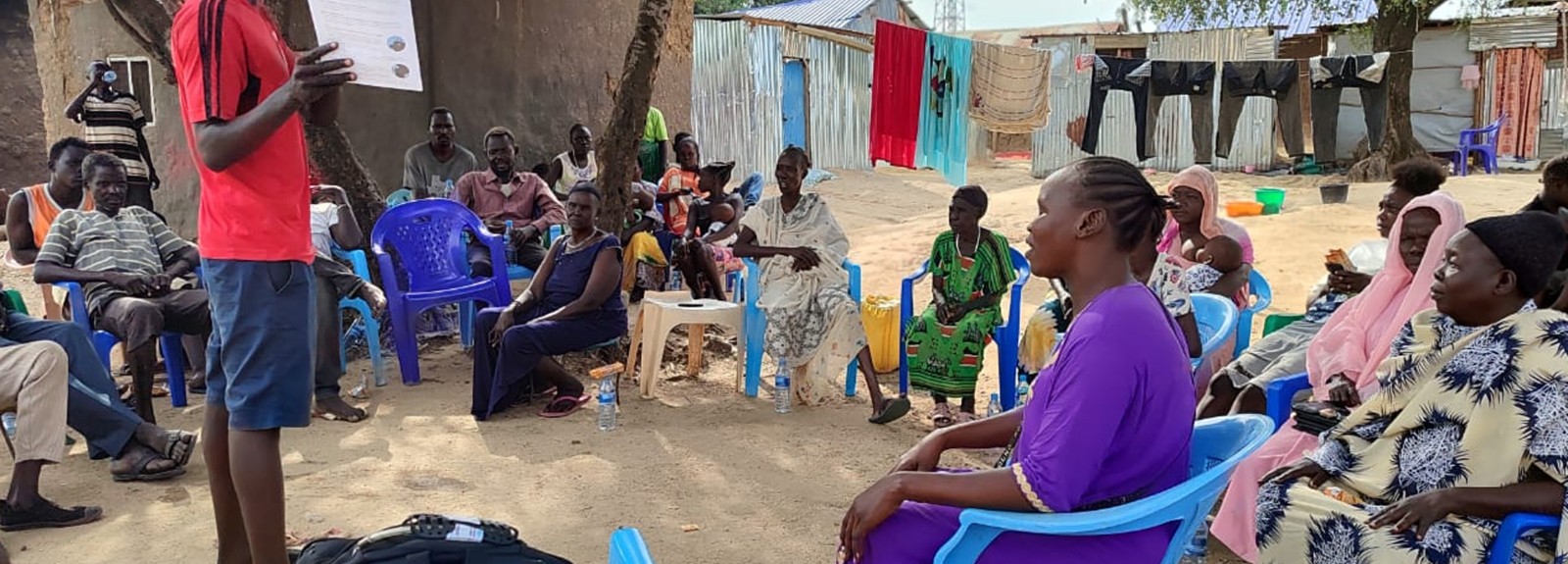At 26 years old, John Alu Michael has spent most of his life on shaky ground in South Sudan. His country first sought independence in 2011 and then entered a civil war, leaving more than 1.5 million persons internally displaced. He has seen the repercussions of a country experiencing internal conflict: endemic poverty and poor health, shattered infrastructure, distrust of government and civil authorities, and high levels of gender-based violence (GBV).
In South Sudan, an estimated 2.5 million people are at risk experiencing GBV. South Sudan’s fragile context and traditional social norms exacerbate this risk, especially for young women and girls. For example:
- The internal displacement of families and orphanhood leads to unaccompanied adolescent girls being forced to get married to gain acceptance and integrate into host communities, which are often of a different ethnic group.
- Child marriage is sometimes used as a coping mechanism in response to economic and food insecurity, with some families marrying off daughters to receive a dowry payment from future husbands.
- Rebel and armed groups use rape as a weapon, with many pregnant victims being forced to marry the perpetrators. In addition, many women and girls have been forced into marriage and prostitution as a means of survival.
As a committee chair in his local community's administrative council (called a Quota Council), John wanted to help end GBV in his town of Nyakuron in the southern outskirts of Juba. When USAID’s MOMENTUM Integrated Health Resilience, which is led by Corus organization IMA World Health, supported local organizations to engage local leaders like him to promote social and behavior change (SBC) within his community, John jumped to join. The activities offered included gender-based community dialogues, couple communication sessions, male engagement board games, awareness sessions through drama and short skits, and radio listening sessions.
John actively engages youth in gender-based discussions through his Quota Council work and through various community youth forums. He also volunteers for numerous area initiatives and creates trust and connection across different age groups.

John Alu discusses his community engagement work in a community gathering spot. Photo: Angelina Boi Nasira, MOMENTUM Integrated Health Resilience South Sudan.
“I got involved (in the community programs) because the activities made a lot of sense, especially the gender-based community dialogues,” explains John. “The sessions enabled me to reflect on issues in this community and in our own family that needed such discussions.” Since John's own mother is the second of his father’s three wives, these issues hit close to home for him.
The focus of the MOMENTUM Integrated Health Resilience’s SBC initiative is prevention and youth; roughly 75 percent of those engaged in these behavior change activities are between 15 and 35 years old. MOMENTUM partners with local organizations such as The Rescue Initiative South Sudan, Shabab le shabab, the Active Youth Association, and the Community Initiative Development Organization to help them reach out. The project supports and participates in youth training sessions run by the organizations and provides health information that strengthens youths’ resilience by enabling them to be aware of and follow healthy behaviors, make good health decisions, and better respond to emergencies.
Youth are a cause for hope in South Sudan
John describes participating in gender-based discussions that were so engaging, the facilitators ended up spending many more hours in the community than planned.
“We discussed how youth can support the prevention of violence, and how GBV can be prevented through dialogue,” John says. “The most important thing I learned from the sessions is problem solving through dialogue. It’s not good to resort to violence without giving dialogue a chance.”
This approach was particularly valuable when John participated in gender-based discussions with youth gangs in his community.
These discussions resulted in the two gangs signing peace among themselves and refraining from being gang members. As a result of this engagement, they decided to shun violence,” John explains. “And we advised members to report violations against them to the police or the community Quota Council instead of addressing issues through violence. Regular engagement with the youth can create understanding, because most of the youth who join the gangs are school dropouts who lack things to do.
At present, John has mixed feelings about the future of South Sudan.
“The youth can be resourceful if engaged and made aware of their role in country development,” he says. “However, the youth in this community lack things to do, and there are no friendly spaces for youth empowerment. Economically, they have no growth opportunities because most lack skills. Behavior change activities are doing a lot, but (it can be hard for them to enact what they learn).”
Still, John believes there is cause for hope.
“The community engagement sessions have resolved many issues that we see at the community Quota Council,” he notes. “I can say there is a reduced number of GBV cases reported to the council, compared with before the discussions. Previously we received five or six cases per month, but now sometimes we don’t receive any in a month.”

